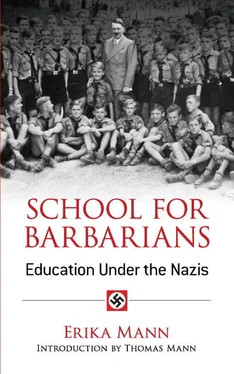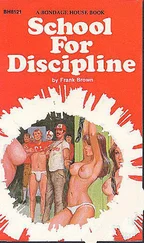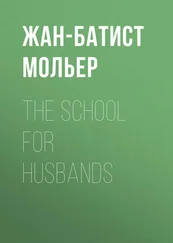It was decided, in Prussia first (November, 1933), and later in all German schools, that public school teachers must belong to a Nazi fighting organization; they were to come to school in uniform, wherever possible, and live in camps; and, during the final examinations, they were to be tested in Geländesport — military sports
This was all deadly serious, and the teachers knew it. Hitler had cried in Weimar, “If there are still people in Germany today who say, we will not join your community, we will remain as we are, then I reply, ‘You will pass on, but after you will come a generation that knows nothing else!’ ”
The teachers, haunted by this verdict, are helping to educate this generation.
“We German educators (says Studienrat L. Grünberg, Commissioner of the Augusta State School in Berlin, in Wehrgedanke und Schule, p. 5) must set ourselves free from the conception that we are merely transmitters of science. A future passage at arms of the German people will determine if the German teaching class has become a useful factor of the German people of the Third Reich.”
That is how the officers of education babble to order. Everything is based on the “future passage at arms of the German people.” And since the Führer has made, above all, the race-consciousness of the people a duty, this race-consciousness, according to the “defense-philosophy,” must insistently occupy the thought of the German educators.
In the Spring of 1937, a decree was issued by Reichswalter und Gauleiter Wächtler:
“I hereby decree that every member of the N.S.L.B. (National Socialist Teachers’ Union) submit a table of his ancestors in three copies, with official documents of proof, or certified copies of the same, to the Sachbearbeiter (specific worker) of the political district to which he belongs, for information as to consanguinity. The Gausachbearbeiter für Sippenkunde is to examine the entries and send on table to the Reich Executive of the Teachers’ Union, retain one copy at district headquarters, and return the third to the applicant, together with all the original documents…. The table of ancestors is to be distributed later by the applicant…. On with the good work! “Fritz Wächtler.”
The educators sit down and “distribute.” The small heroisms of daily life exhaust any independence or courage left in them: a teacher is a hero if he says “Good morning!” instead of “Heil Hitler!” to a pupil, or if he treats a Jewish student with anything but the orthodox abhorrence, or if he singles out a really brilliant scholar who does not happen to be gifted in calisthenics. And a medal might very well be struck for the teacher mentioned in the New Sheet of the N.S.L.B. as “having failed to make contact.” “Strange,” the attack concludes, “for he is an unquestionably excellent teacher. He is an exemplary scholar. His punctuality and meticulous sense of duty have become proverbial in the circle of his associates. His method of teaching has often been tested. The results of his teachings are astonishing. His pupils look up to him as to a father. He is a true comrade to his co-workers. He is always ready to do anyone a favor. And yet… he lacks one thing. When we converse about National Socialist ideology, in spite of all his efforts to comprehend, he shows a strange uncertainty. And if his pupils ask him questions about the purpose and meaning of National Socialist measures, he often finds difficulty in giving adequate answers….”
The name of this eccentric is not given; but he knows what he may expect from now on. The Nazis themselves praise him, and cannot understand why he is unable to “make contact” with them. “An excellent teacher!” He is more; he is a secret hero in that front which fights one at a time today, and whose whole voice we shall hear when its time comes.
In May, 1934, the newly organized and “purged” body of teachers began to give lessons in “National Socialist Meanings.” There were new fundamental maxims, and new textbooks. The scale of values, in order of importance, is set by the Führer:
Hereditary tendencies; general racial picture.
The character (degree of adherence to National Socialism).
The physical makeup or “body” (degree of usefulness in the event of a future war).
(And, last) Knowledge. (Here, the knowledge of objective reality, regarded as a last offshoot of liberalism, is often punishable where it is not merely regarded as absurd and reprehensible.)
But what could the knowledge of objective reality mean? Where would its place be, in a system which reduces all sciences to a single new science called Wehrwissenschaft (the science of defense, although the connection between the German “Wehr” and the English “war” is no coincidence). Education in relation to weapons, then, takes the place of education as we know it. The whole concept is peculiar to Hitler’s Germany. It has been most directly put by a high school principal, Hans Willy Ziegler, in the N.S.L.B. periodical Die Deutsche Schule (June-July, 1935): “Education in relation to weapons, then, is no special branch of general education; rather, it is, in point of fact, the very core of our entire education.”
The “core” grows, penetrates into the political branches, history, “geo-politics,” etc., and even into those which seem to be unpolitical, like mathematics and language. The textbooks demonstrate this growth.
The large, heavy schoolbooks we knew as children, one for each year, Fourth Grade Geography, First Grade History, have not entirely vanished. But they have lost most of their importance, and are replaced by the decisive little pamphlet that supplements the textbook — the propaganda pamphlet.
Three explanations rise for the changed emphasis:
First, “knowledge” is listed all the way down, far below “hereditary tendencies,” “character,” and “the body.” The old textbook, with its ballast of objective knowledge, might stand in the way of physical training in the use of weapons.
Second, development of character in the Nazi sense calls for little instruction in objective truth — that has been acknowledged — but rather for expedient falsifications, propaganda to fit the moment. If the Führer wishes to stress, in his “propaganda for Germanhood abroad,” the sad straits of Germans living in America, a pamphlet will appear, and will disappear as quickly if it seems necessary (to facilitate student exchange, for example) to play up friendly relations. The little pamphlets can be manipulated according to the news; the fat readers could not have been juggled this way.
The third explanation, and the most inclusive, has to do with the “politics of the bad conscience.” Anyone who visited the German Pavilion at the Paris Exposition of 1937 noticed that special care was taken to avoid all Hitler, Nazi or war propaganda. Nothing suggested that you were seeing an exposition presented by, and representative of, the most war-willed dictatorship in the world. There was not one picture of Hitler, not one anti-Jewish poster, not one model of a bombing plane. Hitler, as showman, did not seem convinced that a display of objectives would be popular among visitors from outside of Germany.
As dictator of education, Hitler entertains the same doubts of popular approval in the outer world. And so, following his habit, he advances “diplomatically,” wrapped in mystery, and the official textbooks are confined within acceptable limits; the new Reich Reader is no more honest than the German Pavilion. The Reader is full of patriotic mediocrity, cant about “Earth” and “Blood,” and a few remarks by the Führer and his officials. There are none of the riches that might have been included — nothing by Goethe or Lessing, and of course nothing by Heine.
Читать дальше












